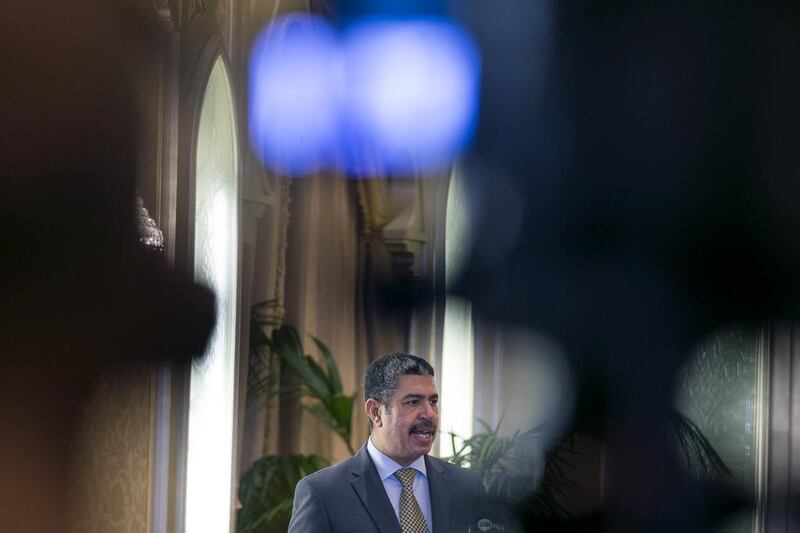ABU DHABI // Houthi rebels and forces loyal to deposed former president Ali Saleh removed nearly US$3 billion, more than Dh11bn, from Yemen’s central bank last year, the country’s prime minister said on Tuesday.
Rebel interference with Yemen’s financial system had reduced its foreign currency reserves from $5.2bn to $2.3bn, Khaled Bahah said. Nevertheless, the legitimate government has set aside US$93 million to rebuild infrastructure devastated by the Houthi rebellion.
After “achieving many victories in the past year, the government will focus on the economic side, by returning the main services such as health, education, water and electricity, roads and others”, Mr Bahah said.
The funds were available because the government intended to spend its revenue directly where it was needed, rather than risk the funds falling into rebel hands.
“The government has decided now to cash these revenues without depositing them through the central bank so it doesn’t reach them,” the prime minister said.
Yemen has been in turmoil since September 2014, when Houthi insurgents backed by Iran took control of the capital, Sanaa. Last year the president, Abdrabu Mansour Hadi, and his internationally recognised government sought refuge in Saudi Arabia, where a military coalition was assembled last March with the aim of restoring the president to power.
The coalition, including forces from the UAE, has liberated the southern port city of Aden and other key provinces, and is closing in on Sanaa.
Mr Bahah recognised the assistance provided by the Arabian Gulf states, but called for greater economic integration of Yemen into the Gulf region.
“Every time we move forward a few steps, we face a setback,” the prime minister said.
“Yemen is passing through a critical moment and should not be left alone to face the challenge posed by the Houthis and Saleh’s group, who kill civilians with impunity, murder Yemeni officials and carry out subversive activities, with the aim of destroying the state’s infrastructure.
“There is a need for a new vision and roadmap to strengthen relations with Yemen’s sisterly states in the Gulf.”
There were “huge gaps” between Yemenis and people in neighbouring countries, he said, with 25 million in Yemen uneducated and an average income of about $900 a year.
“You cannot comprehend that,” Mr Bahah said. “We should be more daring in launching a real project for Yemen.
“Yemen is a big problem for its neighbours but could be a big benefit for its neighbours, so if we deal with it the right way we will find a different product. No big research centres are required to understand that.”
Mr Bahah said he expected the full Yemeni government to return within days. “Not by force,” he said. “We do not wish for that and we wish not to continue with the war.
“It is our ethical responsibility to continue through political negotiations.”
However, the prime minister said eliminating ISIL and Al Qaeda in Yemen would not be achieved by dialogue.
“A confrontation is inevitable, whether it takes place today or tomorrow,” he said.
“We are facing various forms of terrorism aimed at shedding blood, killing innocent people, destroying cities … and endangering liberated regions.”
Although Aden is controlled by the government, there is a growing extremist presence in the city. There have been several attacks and assassinations, and Mr Bahah himself escaped an ISIL bombing in Aden last year.
Mr Bahah met the UN secretary general Ban Ki-moon in Abu Dhabi on Tuesday at the World Future Energy Summit.
Mr Ban urged all parties in Yemen and other states in the region to commit to a comprehensive and permanent ceasefire to enable the rapid resumption of already delayed peace talks.
The secretary general’s special envoy for Yemen, Ismail Ould Cheikh Ahmed, adjourned peace talks in Switzerland in December to allow for bilateral consultations on establishing a ceasefire.
hdajani@thenational.ae
* Additional reporting by Wam and Agence France-Presse







